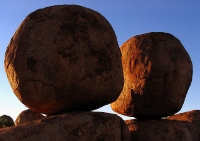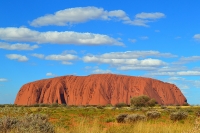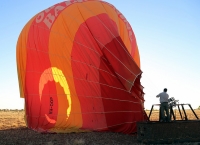City guides


Alice Springs Travel Guide
Alice Springs, the vibrant hub of central Australia, grew up around a permanent waterhole that was a key terminal for the Overland Telegraph Station in 1870. It became a tough frontier town serviced by camel trains from the railhead at Oodnadatta, until the railway reached it in 1929 and it became a transport centre. Today the small city, with a population of roughly 26,000 and stylish shopping and dining facilities, thrives on tourism and provides a perfect base from which to access all of the surrounding natural wonders, including Uluru (Ayer's Rock).
Alice Springs also invites visitors to learn more about the local Arrernte Aboriginal tribal group who have inhabited the area for 20,000 years. The city is also the point from which intrepid adventurers popularly strike south to explore the Simpson Desert, or east to visit the ghost towns of the MacDonnell Ranges. Alice Springs has good connections to Australia's capital cities; there are daily flights to and from the capitals and road and rail access from all capital cities is possible.
Anyone who has a fascination with the rough and ready life of Central Australia will enjoy a holiday in Alice Springs, which is an ideal base for excursions into the surrounding desert.
Things to do in Alice Springs
Once a remote outpost, it is now easy to travel to Alice Springs, situated in the heart of the Australian Outback. A holiday in Alice Springs is a true Australian experience, its proximity to the desert and the remarkable natural monolith, Uluru (Ayers Rock) drawing tens of thousands of tourists every year. 'The Alice', as it is known, is also the focus of Aboriginal culture in Australia. Apart from the famous Uluru, one of Australia's most iconic landmarks, visitors to Alice shouldn't miss an excursion to Tennant Creek, an old mining town which has become very popular with tourists, and the nearby Devil's Marbles, some stunning red rock formations.
The city has an exciting and slightly odd events calendar so it is a good idea for visitors to plan their Alice Springs holiday to coincide with one of these, such as the Camel Cup tournament, Finke Desert Race or Alice Springs Beanie Festival.

Tennant Creek
Now a popular holiday resort, the old mining town of Tennant Creek, about 300 miles (500km) north of Alice Springs, was allegedly born when a beer wagon en route to an Overland Telegraph Station broke down in 1934 and the driver, Joe Kilgariff, decided to set up a store and pub at the breakdown site. Such legends abound in the Tennant Creek area, which was the site of Australia's last gold rush.
At the Battery Hill Mining Centre visitors on holiday can take a mine tour and hear the miners' stories, before enjoying a nature walk and a picnic. The small holiday town is situated at the junction of the Stuart Highway, which runs between Darwin and Alice Springs, and the Barclay Highway that travels east to Mt Isa.
Tennant Creek is an excellent point from which to make an excursion to the fascinating signature landforms of the area, the granite boulders known as the Devil's Marbles. Thousands of huge, red boulders, some nestling together and others poised on top of each other, are a compelling spectacle in this shallow valley 60 miles (100km) south of Tennant Creek. The local Aboriginal people regard the Devil's Marbles site as a sacred place, believing that the boulders are the eggs of the Rainbow Serpent.

Uluru-Kata Tjuta National Park
Formerly known as Ayres Rock, Uluru rises from the surrounding plains within the Uluru, Kata Tjuta National Park, and belongs to the Anangu Aboriginal people, for whom it holds a special spiritual significance. In an isolated spot 280 miles (450km) from Alice Springs, the power of the rock draws hundreds of visitors taken on tours by Aboriginal guides who explain the monolith's importance in Aboriginal culture. A visit to this monolithic rock, the world's greatest, is an awesome experience. It is composed of a type of sandstone that has been exposed through folding, faulting, the erosion of rock and infill. At the base are caves, inlets and overhangs formed by chemical degradation and erosion.
Some opt for the 1,142ft (348m) climb to the top, which takes about 45 minutes and is not for the faint-hearted; however, it should be noted that for spiritual reasons the Anangu people request that visitors not climb the rock. Visitors should try to view Uluru at different times of the day, as a part of the magic of the rock is its constant colour changes in different lights, particularly at sunrise and sunset. Visitors can take a camel tour of the Outback at Uluru, or enjoy an unforgettable flight in a light aircraft or helicopter for a bird's eye view of the monolith.
About 19 miles (30km) from Uluru is another fascinating geological formation on the desert landscape. Known as Kata Tjuta (formerly known as the Olgas), these comprise 36 domes of red-brown earth, the tallest of which, Mount Olga, is 656ft (200m) taller than Uluru. There is a range of accommodation at Uluru, from luxury resorts to campsites. There is also an Aboriginal cultural centre and an arts and craft centre, along with restaurants, swimming pools, galleries, a supermarket, a medical centre and a post office.

Outback Ballooning
Surely the most iconic image of Australia is the blood-red dust of its sere and sparse Outback, and what better way to experience it than from a hot air balloon, in the dawn hours, with the sky full of a million colours? Alice Springs' Outback Ballooning company has been offering this once-in-a-lifetime experience to eager visitors since 1986, and has built a solid reputation for itself as a high-quality, and dependable tour operator (with an impeccable safety record).
Visitors will be accompanied on their hot air balloon ride (which also includes refreshments and a light breakfast) by an informative guide, to ensure they appreciate the full impact of the unique landscape spread out beneath them. Visitors of all ages, sizes, shapes and fitness levels are welcome, and are all bound to leave with a memory they'll cherish for the rest of their lives.
Alice Springs Climate and Weather
The climate of Alice Springs is arid; hot, dry and dusty nearly all year round, except for winter nights, which can have temperatures dramatically plummeting to below freezing. Summers are blisteringly hot with the mercury regularly rising to over 104ºF (40ºC), with winter daytime temperatures remaining pleasantly warm. Rain is infrequent and unpredictable, with heavy showers occurring sometimes during summer.
The most popular time to visit Alice Springs is in the cooler months between April and September.
Australia travel info
Electricity
Electrical current is 230 volts, 50Hz. Three-pin flat blade plugs are used but are different to those in most other countries, so an adapter is normally required.
Language
English is the official language of Australia.
Money
The unit of currency is the Australian dollar (AUD), which is divided into 100 cents. Credit cards are widely accepted and ATMs are freely available throughout the country. Banks and bureaux de change exchange most foreign currencies. Banking hours are generally 9.30am to 4pm, Monday to Thursday, and 9.30am to 5pm on Friday, but some banks offer extended hours and some are open on Saturday mornings.
Tipping
Most service providers in Sydney don't expect a tip, so travellers shouldn't feel pressured into giving one. A tip of 10 percent is standard in restaurants, however, and passengers usually round up to the nearest dollar or more in taxis.
Health
A yellow fever vaccination certificate is required by travellers over one year of age arriving within six days of having stayed overnight or longer in an infected country. No other special immunisations or medications are required for most trips to Australia; however, insect repellents are strongly advised because of the risk of mosquito-borne illnesses. Another health risk is sunburn, and visitors are advised to take precautions. Medical services are excellent but can be expensive, so travellers should ensure that they have adequate insurance. Australia has a reciprocal health agreement with the United Kingdom providing for free hospital emergency medical treatment; proof of UK residence is required.
Safety
The crime rate in Australia is low; however, travellers should be aware that tourists could be targeted by petty criminals. Visitors should be vigilant about personal possessions and travel documents, particularly in popular tourist destinations such as along the Gold Coast. Tropical cyclones normally occur between November and April in some parts of Australia, particularly in Western Australia, Queensland and the Northern Territory. There is a serious risk of bush fires in summer (November to March), especially in Victoria, Tasmania, New South Wales and ACT. Also during the summer months, the shallow coastal waters of northern Australia and Queensland become infested with marine stingers, commonly known as box jellyfish, whose sting is highly dangerous and can be deadly. Visitors should pay attention to signs on beaches and follow the instructions of local lifeguards to avoid injury.
Local customs
Generally an informal attitude, in dress and behaviour, prevails in most social and business situations. Sport, particularly rugby and cricket, is almost a religion in Australia.
Doing business
Those doing business in Australia are sure to find that the friendly yet professional corporate atmosphere of the country will provide them with an exciting opportunity to develop their careers. The business culture of Australia is a bit of a hybrid breed, incorporating the trappings of British formality and conservatism, the egalitarian ethos of Scandinavian countries, and the dynamic, innovative approach to business that is generally thought of as American in origin - rounded out, of course, with typical Australian warmth and humour. The approach to management in Australia is consultative, pragmatic, and strictly non-hierarchical. Those in positions of relative power are accorded respect by virtue of their personal qualities, not simply because they happen to be the boss.
Business etiquette in Australia further reflects this egalitarian ethos. Business people should use titles initially, though they will almost certainly be told to dispense with them and refer to their colleagues by their first names. They should maintain eye contact when speaking to their associates, as this is regarded as a sign of forthrightness and trustworthiness, qualities that Australian business people tend to favour over showiness, self-aggrandisement or empty promises. Business meetings in Australia should be scheduled about a week in advance, and then confirmed a few days before they are due to take place.
Colleagues should be punctual, as lateness can be seen as a symptom of flakiness or indifference. Business meetings in Australia do not generally proceed from a set agenda. Rather, they are viewed as open forums, in which ideas are to be debated and discussed. In fact, over-preparing for a meeting can make participants seem pushy, as though they wish to bully others into adopting their opinions on the issue at hand. The dress code for business in Australia remains surprisingly traditional: dark suits and ties are the norm for men; for women, business suits, worn either with pants or a skirt. As a general rule, business people should avoid loud jewellery and accessories, as to Australian eyes they might make them seem arrogant. The official language of business in Australia is English, and business hours are generally from 8.30am (or 9am) to 5pm (or 5.30pm), Monday to Friday.
Duty free
Travellers to Australia over 18 years do not have to pay customs duty on 2.25 litres of alcohol; and 25 cigarettes or 25g of cigars or tobacco products. All tobacco products in travellers' baggage are included in this category, regardless of where they were purchased. Gifts are included in the A$900 duty-free allowance. Fresh produce and animal or plant products are prohibited.
Communications
The international dialling code for Australia is +61. Hotels, cafes and restaurants offering free WiFi are widely available; purchasing a local prepaid SIM card can be a cheaper option than paying international roaming costs, which can be quite high.
Passport & Visa
A valid passport and a visa or ETA is required for travel to Australia. An ETA is an electronically issued and verified visa, not visible in a passport. ETAs are issued to passengers travelling for touristic or business purposes. Tourist ETAs are usually valid for three months. ETAs are obtainable online at: www.eta.immi.gov.au or through most travel agents. It is highly recommended that passports are valid six months after departure from a holiday destination.
Entry requirements
US nationals must have a valid passport on arrival. A pre-obtained Electronic Travel Authority (ETA) is required for stays of up to three months.
UK nationals must have a passport valid for intended period of stay. A pre-arranged Electronic Travel Authority (ETA) is required for stays of up to three months.
Canadian nationals require a passport valid for intended period of stay. A pre-arranged Electronic Travel Authority (ETA) is required for stays of up to three months.
South African nationals must have a passport valid for at least six months after their date of departure. A visa is required.
Irish nationals must have a passport that is valid on arrival. A pre-arranged Electronic Travel Authority (ETA) is required for stays up to three months.
New Zealanders require a valid passport on entry to Australia. A Special Category Visa (SCV) is issued on arrival after completing a passenger card.
Useful contacts
Australian Tourist Commission, Sydney: +61 (0)2 9360 1111 or www.australia.com
Emergencies: 000 (112 on cellphones)Embassies / consulates in other countries
Embassy of Australia, Washington DC, United States: +1 202 797 3000.
Australian High Commission, London, United Kingdom: +44 (0)20 7379 4334.
Australian High Commission, Ottawa, Canada: +1 613 236 0841.
Australian High Commission, Pretoria, South Africa: +27 (0)12 423 6000.
Australian Embassy, Dublin, Ireland: +353 (0)1 664 5300.
Australian High Commission, Wellington, New Zealand: +64 (0)4 473 6411.
Embassies / consulates in Australia
Embassy of the United States, Canberra: +61 (0)2 6214 5600.
British High Commission, Canberra: +61 (0)2 6270 6666.
Canadian High Commission, Canberra: +61 (0)2 6270 4000.
South African High Commission, Canberra: +61 (0)2 6272 7300.
Embassy of Ireland, Canberra: +61 (0)2 6214 0000.
New Zealand High Commission, Canberra: +61 (0)2 6270 4211.


